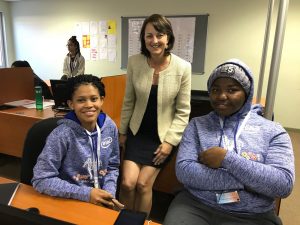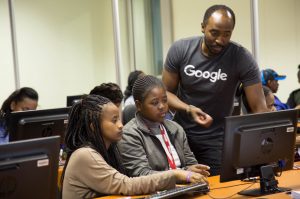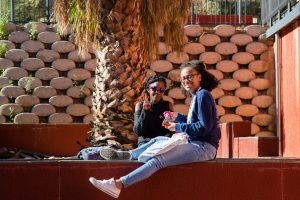-
What We Do
- WHERE WE WORK
-
About Us
 Welcome Message from Carol Jenkins
Welcome Message from Carol JenkinsFor more than 90 years, World Learning has equipped individuals and institutions to address the world’s most pressing problems. We believe that, working together with our partners, we can change this world for the better.
On my travels, I’ve had the opportunity to meet with many of those who have joined us in this mission. In Baghdad, we’ve trained more than 2,300 Iraqi youth who are already giving back at home. In London, our partners in the TAAP Initiative strongly believe that we are all responsible to practice inclusion. And in Vermont, our Experiment in International Living and School for International Training participants prove every day that they have the tools and the determination to change the world.
Please join us in our pursuit of a more peaceful and just world.
- Get Involved
Media Center > Story
The 2018 WiSci STEAM Camp Kicks Off with NASA, Google, and Teen Girls From Five Countries
August 9, 2018
This week, nearly 100 high school girls from across the U.S. and sub-Saharan Africa have arrived in Windhoek, Namibia, where they’re learning how to say hello to Harry Potter through code, design apps for painting pictures on their tablets, build lights out of tiny computers — and so much more.
These teenagers are taking part in the 2018 Women in Science (WiSci) Girls STEAM Camp, which has brought together girls from the United States, Namibia, Kenya, Ethiopia, and eSwatini (the former Swaziland) for two weeks to learn about one another’s cultures and develop their skills in science, technology, engineering, arts and design, and mathematics (STEAM).

“It’s a wonderful opportunity for the girls in terms of broadening their world and making them stronger and realizing what opportunities and potential is out there, particularly in the STEAM fields,” said U.S. Ambassador to Namibia Lisa Johnson, who has attended a number of WiSci sessions this week.
Funded by the U.S. Department of State and run by World Learning, WiSci operates through a public-private partnership with Google, NASA, Intel, and the United Nations Foundation’s Girl Up. Representatives from these partner organizations are leading classes introducing teens to the STEAM fields and mentoring the girls on their potential academic and career paths.
Funded by the U.S. Department of State and run by World Learning, WiSci operates through a public-private partnership with Google, NASA, Intel, and the United Nations Foundation’s Girl Up. Representatives from these partner organizations are leading classes introducing teens to the STEAM fields and mentoring the girls on their potential academic and career paths.
NASA and Google kicked off the academic components of WiSci this week, offering hands-on classes and activities.
With the help of NASA instructors, the girls tried their hands at Javascript programming using satellite data visualization tools like the Google Earth Engine. “It was fun to see the girls start putting things into the computer and then get that a-ha moment when they pressed the ‘run’ button and it did what they had instructed it to do,” Ambassador Johnson said. “You see it light up in their eyes. It was definitely having an impact.”

Google employees also highlighted how they use technology to make a difference in people’s lives. They demonstrated some of that technology — including theTalkBack app for vision-impaired Android users and a smart spoon designed for people with hand tremors — and helped girls build their own apps that take accessibility into account.
“I challenge you to go out into your classrooms today and build something great,” said Eve Andersson, director of accessibility engineering at Google.
WiSci also focuses on leadership development and cultural exchange. Camp counselors are hosting daily leadership development and empowerment workshops with the campers with the support of Girl Up and, in the evenings, the campers are putting on performances exploring the music, dance, customs, and more from their home countries.
 “You can see how excited they are to be here,” Ambassador Johnson said. “They’re not hesitant at all to ask questions, they want to learn, they’re super engaged. That’s really awesome to see.”
“You can see how excited they are to be here,” Ambassador Johnson said. “They’re not hesitant at all to ask questions, they want to learn, they’re super engaged. That’s really awesome to see.”
Next week, the girls of WiSci will turn their focus to robotics and AI as Intel takes over classroom duty, and they’ll also begin to develop their own projects to explore firsthand how STEAM education can make a difference in the world.





